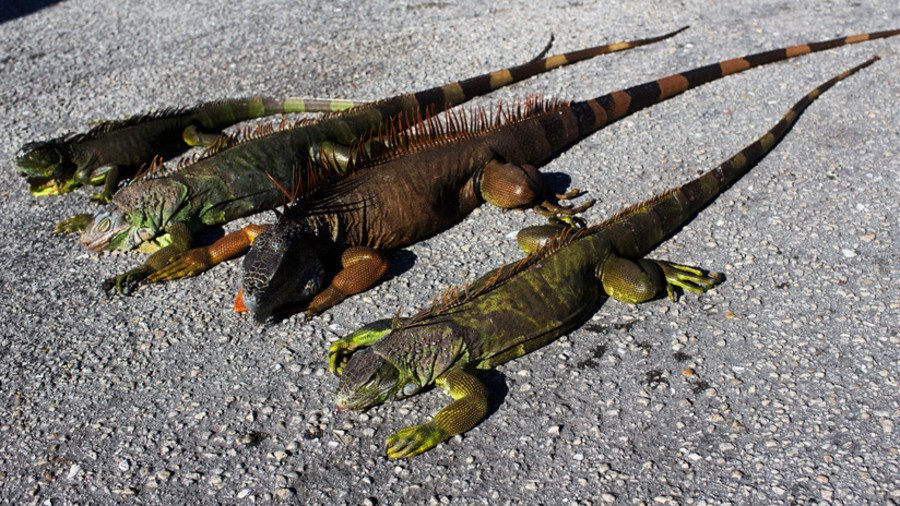Let frozen iguanas lie: Floridians attacked by newly-thawed reptiles

The recent cold snap in Florida has led to multiple reports of frozen iguanas falling from their perches. However bad you might feel for the frigid critters, it’s definitely not a good idea to pick them up.
Something of an iguanapocalypse is happening in South Florida as the state experiences unseasonably cold temperatures. Iguanas can be ‘cold stunned’ if temperatures drop below 45 degrees Fahrenheit (seven degrees Celsius), becoming immobilized and entering something of a cold-coma. This week it dropped as low as 38 degrees in Palm Beach.
The frozen iguana petrified next to my South Florida swimming pool yesterday, reanimated himself in the afternoon sun. Here he is walking it off ... After another cold night, though, he's probably a green popsicle again this morning. pic.twitter.com/nOept7ksJT
— Frank Cerabino (@FranklyFlorida) January 5, 2018
Some good samaritans have taken it upon themselves to dispose of iguana corpses that have fallen from surrounding trees overnight, only to learn that they’re not actually dead and, it appears, are in fact quite feisty when they awake from their slumber.
READ MORE: ‘Freezing to death a horrible way to die’: Ohio sheriff warns pet owners
One man in Key Biscayne, a town south of Miami Beach, learned this lesson the hard way when he collected a bunch of gray, stone-cold, iguanas that had fallen from a stretch of trees, loading them into his vehicle.
Soon after, the seemingly ‘dead’ iguanas came to life in the now warmed up vehicle and attacked the driver, according to wildlife expert Ron Magill, who recounted the incident on NPR.
There’s been an #iguana living in my parents yard in Miami for last 2 years. We found him like this today- We are trying to revive him 🙏We have a lamp on him, he opened his eye & moved his arm, but not much else. #FrozenIguana 😞❄️ pic.twitter.com/47zZhtlABb
— MiamiGator (@GeoffMiami) January 5, 2018
READ MORE: Iggy popsicle: Freezing iguanas fall from trees in Florida (PHOTOS)
Apparently, iguanas under 2-feet (60 cm) in length are usually too small to withstand the freezing and thawing process, but in general, larger iguanas are more likely to survive without any lasting ill effects.
The iguana fared well but he has another cold night ahead! pic.twitter.com/zR0PFI7Oku
— Kay Pavkovich (@kay_pavkovich) January 4, 2018
READ MORE: Extraordinary storm systems visible in ‘bomb’ cyclone’s eye (VIDEO)
It seems it’s not the first time Floridians have fallen into the iguana’s pseudocide trap. In January 2010, South Florida experienced nearly two weeks where temperatures fluctuated in the 30 to 40-degree range, according to the the Palm Beach Post.
“In 2010 when the frozen iguanas began to fall a friend’s neighbor collected a huge black plastic garbage bag of them and when the bag was placed in his car to be taken to dump, the great iguana thawing occurred in his moving vehicle. He was not happy,” wrote local microbiologist Larry Lynam on Twitter.
In 2010 when the frozen iguanas began to fall a friend’s neighbor collected a huge black plastic garbage bag of them and when the bag was placed in his car to be taken to dump, the great iguana thawing occurred in his moving vehicle. 😂 He was not happy. https://t.co/lKb6Ma0ilB
— Larry Lynam (@scopedbylarry) January 4, 2018














